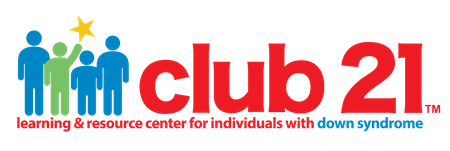Club 21 Scholars Program
What is the Club 21 Scholars program?
Club 21 Scholars will build relationships between Club 21 and our surrounding communities. Each year, there will be a cohort of Club 21 Scholars who will learn how disability, race, education and family systems impact the life of someone with a disability. They will learn how their life and history intersect and can impact systems and families. The goal of the program is for students who participate to learn about the issues that individuals with disabilities face, how issues of racial and social justice intersect with their own identities, and those of the Club 21 community.
Who can be a Club 21 Scholar?
To be a Club 21 Scholar, you must be a senior or junior in a public Pasadena high school. Scholars should be interested in and open to learning more about the disability community, the history of disability rights, career pathways for serving individuals with disabilities, and themselves. Scholars must strive to be inclusive, open minded, and welcoming to those from diverse backgrounds. To be considered for this program, students must complete a written application with the potential for an interview with the program coordinators.
What do the Scholars do?
There are four aspects to the Club 21 Scholars program. During the school year, Scholars should expect to commit approximately 8 hours per month. A portion of this commitment will occur on the second Saturday of each month. From August 2022 through May 2023, Scholars will participate in the following activities:
1. Regular Education Meetings: These will occur on the second Saturday of each month and will be facilitated by two Club 21 program coordinators. Each meeting will focus on a different aspect of disability services and the disability rights world as well as address the intersecting racial and social equity issues.
These meetings may include guest speakers, video screenings, and discussions, as well as reflection opportunities. Possible topics include:
- The assumptions that are made about Down syndrome and other disabilities
- The history of disabilities and the intersection of race and disabilities
- The importance of language: people first language and why it matters
- What is the American Disabilities Act (ADA) and how does it impact families and education
- Disability service providers and their roles: OTs, PTs, SLPs, doctors, teachers, etc.
- How do individuals with disabilities access resources: regional centers, state and federal agencies and funding, etc.
- What is like having Down syndrome in the public school system: a self-advocate panel
- Interviews and connections with parents
- How can Art and Technology change the view and life of a person with disabilities
- Teaching independence vs learned helplessness
- What are the outcomes of employment and interdependence for people with disabilities
2. Volunteer service with Club 21: Scholars will be expected to volunteer at Second Saturday educational programming. These occur monthly on the second Saturday of each month from August to May, and consist of an all day commitment. They will obtain hands-on experience and interaction with individuals with Down syndrome, their families, and professionals who serve them. There will also be a time during the day to gather as a cohort and reflect on lessons learned that day and experience the education meetings outlined above.
3. Connecting with families: Each Scholar will have the opportunity to spend time with a few families one-on-one to promote mutual understanding and reflection. The exact expectation will be further outlined to Scholars, but scheduling options will be flexible.
During the Summer, during May and June of 2023, Scholars will have the opportunity to rotate between and spend time with professionals from the service and educational fields relating to individuals with Down syndrome and other disabilities. This creates a direct line for Scholars to gain experience in potential career pathways and provide hands-on knowledge.
What will Club 21 Scholars gain from this program?
- Upon completion of the program, Scholars will be eligible to receive a scholarship to be used for the pursuit of their higher education.
- Scholars will gain knowledge about the intersections of race and disability, as well as issues of access and equity
- Scholars will gain experience and knowledge of potential career pathways that serve individuals with disabilities.
- Scholars will foster an understanding of how systems can support families as well as create barriers for people with disabilities and those who belong to other marginalized populations.
- Scholars will develop relationships with families, professionals, and one another that go beyond just learning information, but also foster transformation.
- Scholars will gain opportunities to learn and listen so that they can grow into advocates and self-advocates in whatever field they choose to pursue.
- Scholars will gain confidence as they see themselves as an important part of changing long held beliefs and systems.
